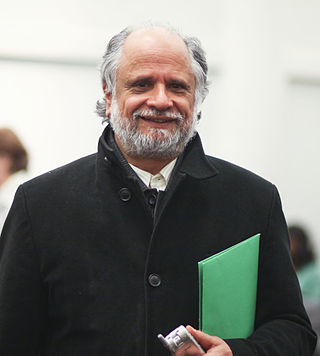Postmodern philosophy is a philosophical movement that arose in the second half of the 20th century as a critical response to assumptions allegedly present in modernist philosophical ideas regarding culture, identity, history, or language that were developed during the 18th-century Age of Enlightenment. Postmodernist thinkers developed concepts like difference, repetition, trace, and hyperreality to subvert "grand narratives", univocity of being, and epistemic certainty. Postmodern philosophy questions the importance of power relationships, personalization, and discourse in the "construction" of truth and world views. Many postmodernists appear to deny that an objective reality exists, and appear to deny that there are objective moral values.

Cultural identity is a part of a person's identity, or their self-conception and self-perception, and is related to nationality, ethnicity, religion, social class, generation, locality or any kind of social group that has its own distinct culture. In this way, cultural identity is both characteristic of the individual but also of the culturally identical group of members sharing the same cultural identity or upbringing. Cultural identity is a fluid process that is changed by different social, cultural, and historical experiences. Some people undergo more cultural identity changes as opposed to others, those who change less often have a clear cultural identity. This means that they have a dynamic yet stable integration of their culture.

Homi Kharshedji Bhabha is an Indian-British scholar and critical theorist. He is the Anne F. Rothenberg Professor of the Humanities at Harvard University. He is one of the most important figures in contemporary postcolonial studies, and has developed a number of the field's neologisms and key concepts, such as hybridity, mimicry, difference, and ambivalence. Such terms describe ways in which colonised people have resisted the power of the coloniser, according to Bhabha's theory. In 2012, he received the Padma Bhushan award in the field of literature and education from the Indian government. He is married to attorney and Harvard lecturer Jacqueline Bhabha, and they have three children.
Feminist geography is a sub-discipline of human geography that applies the theories, methods, and critiques of feminism to the study of the human environment, society, and geographical space. Feminist geography emerged in the 1970s, when members of the women's movement called on academia to include women as both producers and subjects of academic work. Feminist geographers aim to incorporate positions of race, class, ability, and sexuality into the study of geography. The discipline has been subject to several controversies.
Identity is the qualities, beliefs, personality traits, appearance, and/or expressions that characterize a person or group.

Autoethnography is a form of ethnographic research in which a researcher connects personal experiences to wider cultural, political, and social meanings and understandings. It is considered a form of qualitative and/or arts-based research.

Narrative therapy is a form of psychotherapy that seeks to help patients identify their values and the skills associated with them. It provides the patient with knowledge of their ability to live these values so they can effectively confront current and future problems. The therapist seeks to help the patient co-author a new narrative about themselves by investigating the history of those values. Narrative therapy claims to be a social justice approach to therapeutic conversations, seeking to challenge dominant discourses that it claims shape people's lives in destructive ways. While narrative work is typically located within the field of family therapy, many authors and practitioners report using these ideas and practices in community work, schools and higher education. Narrative therapy has come to be associated with collaborative as well as person-centered therapy.

The dialogical self is a psychological concept which describes the mind's ability to imagine the different positions of participants in an internal dialogue, in close connection with external dialogue. The "dialogical self" is the central concept in the dialogical self theory (DST), as created and developed by the Dutch psychologist Hubert Hermans since the 1990s.

Sikhism has no specific teachings about homosexuality and the Sikh holy scripture, the Guru Granth Sahib, does not explicitly mention heterosexuality, homosexuality or bisexuality. The universal goal of a Sikh is to have no hate or animosity to any person, regardless of factors like race, caste, color, creed or gender.
Hybridity, in its most basic sense, refers to mixture. The term originates from biology and was subsequently employed in linguistics and in racial theory in the nineteenth century. Its contemporary uses are scattered across numerous academic disciplines and is salient in popular culture. Hybridity is used in discourses about race, postcolonialism, identity, anti-racism and multiculturalism, and globalization, developed from its roots as a biological term.
Collective identity is the shared sense of belonging to a group.
Feminist epistemology is an examination of epistemology from a feminist standpoint.
Postcolonialism is the critical academic study of the cultural, political and economic legacy of colonialism and imperialism, focusing on the impact of human control and exploitation of colonized people and their lands. More specifically, it is a critical theory analysis of the history, culture, literature, and discourse of imperial power.
Practice theory is a body of social theory within anthropology and sociology that explains society and culture as the result of structure and individual agency. Practice theory emerged in the late 20th century and was first outlined in the work of the French sociologist, Pierre Bourdieu.

In critical theory, sociology, and psychoanalysis, the gaze, in the philosophical and figurative sense, is an individual's awareness and perception of other individuals, other groups, or oneself. The concept and the social applications of the gaze have been defined and explained by existentialist and phenomenologist philosophers. Jean-Paul Sartre described the gaze in Being and Nothingness (1943). Michel Foucault, in Discipline and Punish: The Birth of the Prison (1975), developed the concept of the gaze to illustrate the dynamics of socio-political power relations and the social dynamics of society's mechanisms of discipline. Jacques Derrida, in The Animal That Therefore I Am (1997), elaborated upon the inter-species relations that exist among human beings and other animals, which are established by way of the gaze.
Feminist ethics is an approach to ethics that builds on the belief that traditionally ethical theorizing has undervalued and/or underappreciated women's moral experience, which is largely male-dominated, and it therefore chooses to reimagine ethics through a holistic feminist approach to transform it.
Diana Meyers is a philosopher working in the philosophy of action and in the philosophy of feminism. Meyers is professor emerita of philosophy at the University of Connecticut.
Feminist post-structuralist discourse analysis (FPDA) is a method of discourse analysis based on Chris Weedon's theories of feminist post-structuralism, and developed as a method of analysis by Judith Baxter in 2003. FPDA is based on a combination of feminism and post-structuralism. While it is still evolving as a methodology, FPDA has been used by a range of international scholars of gender and language to analyse texts such as: classroom discourse, teenage girls' conversation, and media representations of gender. FPDA is an approach to analysing the discourse of spoken interaction principally.
Queer of color critique is an intersectional framework, grounded in Black feminism, that challenges the single-issue approach to queer theory by analyzing how power dynamics associated race, class, gender expression, sexuality, ability, culture and nationality influence the lived experiences of individuals and groups that hold one or more of these identities. Incorporating the scholarship and writings of Audre Lorde, Gloria Anzaldúa, Kimberlé Crenshaw, Barbara Smith, Cathy Cohen, Brittney Cooper and Charlene A. Carruthers, the queer of color critique asks: what is queer about queer theory if we are analyzing sexuality as if it is removed from other identities? The queer of color critique expands queer politics and challenges queer activists to move out of a "single oppression framework" and incorporate the work and perspectives of differently marginalized identities into their politics, practices and organizations. The Combahee River Collective Statement clearly articulates the intersecting forces of power: "The most general statement of our politics at the present time would be that we are actively committed to struggling against racial, sexual, heterosexual, and class oppression, and see as our particular task the development of integrated analysis and practice based upon the fact that major systems of oppression are interlocking. The synthesis of these oppressions creates the conditions of our lives." Queer of color critique demands that an intersectional lens be applied queer politics and illustrates the limitations and contradictions of queer theory without it. Exercised by activists, organizers, intellectuals, care workers and community members alike, the queer of color critique imagines and builds a world in which all people can thrive as their most authentic selves- without sacrificing any part of their identity.

Body theory is a sociological theory that involves the analysis of the ordered body, the actions, and approaches towards the notion of lived body, or the conceptions of the body. It is also described as a dynamic field that involves various conceptualizations and re-significations of the body as well as its formation or transformation that affect how bodies are constructed, perceived, evaluated, and experienced.







